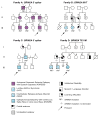GRIN2A mutations cause epilepsy-aphasia spectrum disorders
- PMID: 23933818
- PMCID: PMC3868952
- DOI: 10.1038/ng.2727
GRIN2A mutations cause epilepsy-aphasia spectrum disorders
Abstract
Epilepsy-aphasia syndromes (EAS) are a group of rare, severe epileptic encephalopathies of unknown etiology with a characteristic electroencephalogram (EEG) pattern and developmental regression particularly affecting language. Rare pathogenic deletions that include GRIN2A have been implicated in neurodevelopmental disorders. We sought to delineate the pathogenic role of GRIN2A in 519 probands with epileptic encephalopathies with diverse epilepsy syndromes. We identified four probands with GRIN2A variants that segregated with the disorder in their families. Notably, all four families presented with EAS, accounting for 9% of epilepsy-aphasia cases. We did not detect pathogenic variants in GRIN2A in other epileptic encephalopathies (n = 475) nor in probands with benign childhood epilepsy with centrotemporal spikes (n = 81). We report the first monogenic cause, to our knowledge, for EAS. GRIN2A mutations are restricted to this group of cases, which has important ramifications for diagnostic testing and treatment and provides new insights into the pathogenesis of this debilitating group of conditions.
Figures


Comment in
-
Epilepsy: GRIN2A mutations identified as key genetic drivers of epilepsy-aphasia spectrum disorders.Nat Rev Neurol. 2013 Oct;9(10):541. doi: 10.1038/nrneurol.2013.181. Epub 2013 Sep 3. Nat Rev Neurol. 2013. PMID: 23999465 No abstract available.
References
-
- Berg AT, et al. Revised terminology and concepts for organization of seizures and epilepsies: report of the ILAE Commission on Classification and Terminology, 2005–2009. Epilepsia. 2010;51:676–85. - PubMed
-
- Tassinari CA, et al. Encephalopathy with electrical status epilepticus during slow sleep or ESES syndrome including the acquired aphasia. Clin Neurophysiol. 2000;111 (Suppl 2):S94–S102. - PubMed
-
- Tsai M, et al. Clinical genetic study of the epilepsy-aphasia spectrum. Epilepsia. 2012;54:280–287. - PubMed
-
- Deonna TW, Roulet E, Fontan D, Marcoz JP. Speech and oromotor deficits of epileptic origin in benign partial epilepsy of childhood with rolandic spikes (BPERS). Relationship to the acquired aphasia-epilepsy syndrome. Neuropediatrics. 1993;24:83–87. - PubMed
-
- Scheffer IE, et al. Autosomal dominant rolandic epilepsy and speech dyspraxia: a new syndrome with anticipation. Ann Neurol. 1995;38:633–642. - PubMed
Publication types
MeSH terms
Substances
Grants and funding
LinkOut - more resources
Full Text Sources
Other Literature Sources
Medical
Molecular Biology Databases
Miscellaneous

